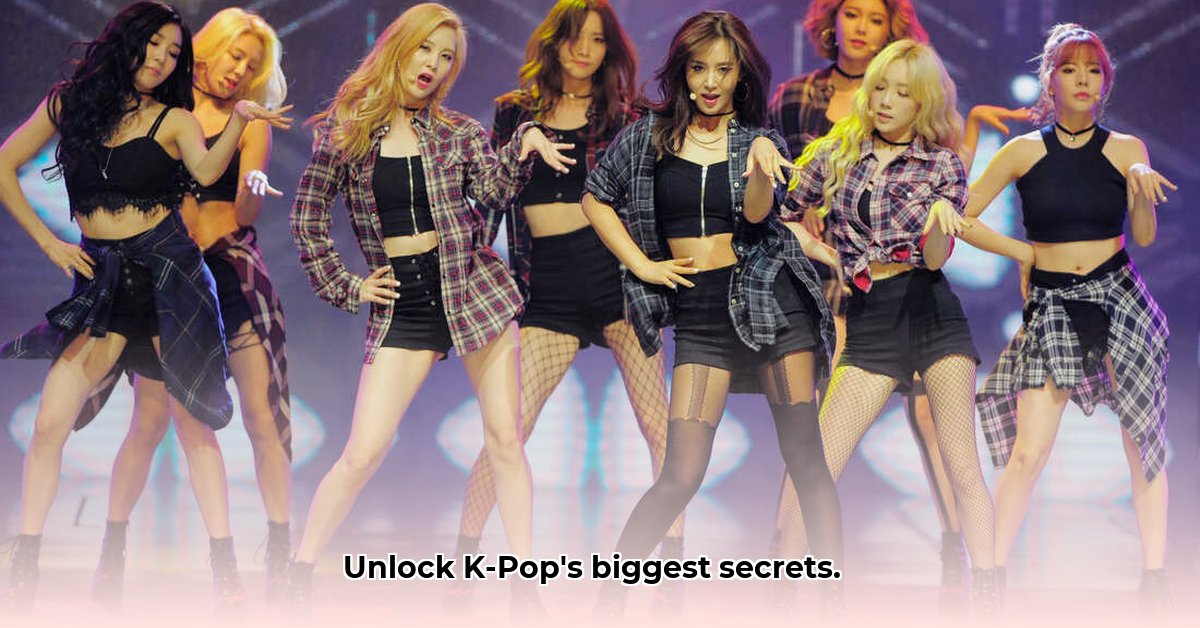So, you want to be a K-Pop star? Awesome! Let’s be real, it’s not just about singing and dancing. Getting there takes serious dedication, the right training, and a smart game plan. This guide is your roadmap to success, breaking down the world of K-Pop training programs. We’ll compare different types of programs – from intense short courses to long-term immersive experiences – looking at costs, how long they take, even visa information if you’re from overseas. We’ll walk you through choosing the program that’s perfect for you, give you insider tips on acing auditions, and help you build a career that lasts. Whether you’re already a pro or just starting to dream, this guide will give you the inside scoop on making your K-Pop dreams a reality. It’s competitive, yes, but we’ll help you navigate it all. For extra dance practice, check out these online K-Pop dance classes.
K-Pop Training: Optimize Your Journey to Stardom
Dreaming of becoming a K-Pop star? It’s a challenging but incredibly rewarding path that requires diligent planning and a strategic approach. This comprehensive guide will help you navigate the intricate world of K-Pop training, empowering you to make informed decisions that maximize your potential for stardom. Let’s get started by optimizing your training journey!
Decoding K-Pop Training Programs: Finding the Right Fit for Skill Development
The landscape of K-Pop training isn’t a monolithic entity; it’s a diverse ecosystem of programs, each distinguished by its unique approach, intensity, and commitment level. Think of it as selecting a university major – some offer focused, accelerated learning, while others provide a broad, immersive education. It’s crucial to explore your options to determine the best path for your individual K-Pop journey.
-
Intensive Short-Term Programs: Envision these as K-Pop boot camps. Designed to impart a concentrated skills boost within a condensed timeframe, they are ideal for refining existing talents and preparing for imminent auditions. These programs typically span weeks or a few months, emphasizing rapid improvement and immediate application. While often more expensive per day, they are a great fit if you already have a solid foundation and need that extra edge.
- Pros: Accelerated skill enhancement, highly targeted curriculum, relatively short time commitment, potential for immediate audition preparation.
- Cons: Higher cost per week, limited time for in-depth skill development, may not be optimal for beginners lacking fundamental skills, can be physically and mentally demanding.
-
Long-Term Immersive Programs: These represent the marathon, not the sprint, of K-Pop training. These comprehensive programs are akin to a university education, encompassing every facet of idol life – singing, dancing, rapping, stage presence, language proficiency, and even media training. They typically span several years and frequently include invaluable opportunities for networking with industry professionals, including talent scouts and producers. They often have higher age requirements and may facilitate visa applications for international students.
- Pros: Holistic skill development across all key areas, significant potential for agency connections and scouting opportunities, cultivates a supportive and collaborative community, facilitates long-term growth and professional development.
- Cons: Substantial financial investment over an extended period, significant time commitment demanding unwavering dedication, potential age restrictions limiting eligibility, requires a high degree of personal sacrifice and commitment.
-
Self-Directed Training: This is the independent route, where you assume the role of CEO of your own training regimen. This path demands immense self-discipline and initiative to design a personalized learning plan and proactively seek out opportunities. While affording the greatest degree of flexibility, this option carries the highest level of personal risk and requires a deep understanding of the industry landscape.
- Pros: Unparalleled flexibility to tailor training to individual needs and preferences, complete control over budget and resource allocation, allows for highly personalized learning experiences and curriculum development.
- Cons: Extremely high level of self-motivation and discipline required to maintain consistent progress, uncertain and potentially lengthy path to success without structured guidance, demands extensive self-research and networking to identify opportunities; lacks structured feedback and mentorship essential for refining skills and navigating the industry.
Your K-Pop Training Roadmap: A Step-by-Step Guide to Achieving Your Dreams
Ready to embark on your K-Pop journey? Here’s a practical roadmap to help you navigate the path:
- Honest Self-Assessment: Rigorous self-evaluation is the cornerstone of effective planning. Before initiating any applications, critically assess your existing skills. Be honest and objective in evaluating your strengths and identifying areas requiring improvement. This process transcends mere ego; it’s about establishing realistic and attainable goals. Seriously consider taking introductory classes or workshops to objectively assess your abilities in singing, dancing, and rapping. Seek honest feedback from instructors or mentors.
- Program Research and Selection: Armed with an understanding of your strengths and weaknesses, you can begin researching programs that align with your skill set, financial resources, and long-term aspirations. The table below provides a preliminary comparison; however, it’s essential to thoroughly investigate each program’s reputation, curriculum, teaching staff, alumni success stories, and tuition fees. Furthermore, location and visa requirements are crucial considerations, particularly for international applicants.
- Mastering the Application Process: Each program will have specific and unique application requirements. Scrutinize all instructions meticulously, prepare high-quality audition materials (videos and recordings are typically required), and ensure timely submission of all required documentation. Remember that rejections are commonplace – they don’t necessarily indicate a lack of talent. Maintain a resilient mindset, continuously refine your skills, seek constructive criticism, and cultivate a network of fellow aspirants.
- The Intensive Training Phase: This marks the commencement of the true transformative work. Be prepared for extended hours of rigorous practice, intensive training sessions, and consistent feedback. Cultivate a balance between dedicated training and proactive self-care to mitigate the risk of burnout. Establishing a supportive community of fellow trainees can provide invaluable peer support and foster a sense of camaraderie.
- Beyond the Classroom: Actively engage in networking opportunities. Attend industry events, connect with other aspiring idols (both online and offline), and strategically build relationships with industry professionals. Seek out opportunities to showcase your progress and talent. Remember to prioritize your holistic well-being – this journey is demanding not only physically but also mentally and emotionally. Most importantly, manage your expectations; the path to becoming a K-Pop star is intensely competitive, and success is never guaranteed.
K-Pop Training Program Comparison: Choosing the Right Path
| Feature | Intensive Short-Term | Long-Term Immersive | Self-Directed |
|---|---|---|---|
| Typical Duration | Weeks to under 1 year | 3-5 years | Highly Variable |
| Cost | High (per week) | High (overall) | Variable |
| Visa Support | Rarely offered | Often included | Not provided |
| Age Restrictions | Generally none | May apply | None |
| Agency Connections | Less likely | More likely | Dependent on initiative |
Remember, your K-Pop journey is a marathon, not a sprint. Sustained success demands unwavering dedication, resilience in the face of adversity, and a genuine, unyielding passion for music and performance. The path is undoubtedly challenging, but your dreams are undoubtedly worth fighting for. Are you prepared to embark on your own incredible journey?
Financial Planning: How to Choose the Best K-Pop Trainee Program Based on Cost and Success Rate
Key Takeaways:
- The K-Pop trainee system is fiercely competitive, requiring significant investments of both time and financial resources. Success is by no means guaranteed, so careful planning is paramount.
- Training programs exhibit considerable variations in duration, cost, and intensity.
- Thorough and diligent research is absolutely crucial; carefully consider program structure, the agency’s reputation (including ethical standards), and the level of trainee support provided.
- A realistic and objective self-assessment of your skills and commitment level is essential for making informed decisions.
- Prioritizing mental wellness is critical throughout the process, particularly in managing the financial stresses involved.
Understanding the K-Pop Trainee Landscape and Career Opportunities
Dreaming of becoming a K-Pop idol? The pursuit of a K-pop career is a thrilling, yet demanding endeavor. The perceived glamour often obscures the rigorous, and frequently costly, training process. One critical question to address is: How to choose the best K-Pop trainee program based on cost and success rate? Let’s break down the complexities and explore the available career opportunities.
Types of K-Pop Trainee Programs: A Comparative Look at Performance Development
Multiple pathways can lead to a K-Pop debut, each presenting distinct advantages and disadvantages concerning overall performance development.
-
Intensive Short-Term Programs:
- Pros: Accelerated progression due to focused training, potentially lower overall cost (despite higher cost per week), best suited for individuals with existing skills seeking immediate refinement.
- Cons: Intense pressure to improve rapidly, potentially less individualized attention from instructors, higher risk of burnout due to high competition, limited opportunity for building foundational skills.
-
Long-Term Immersive Programs:
-
Pros: Comprehensive training across all essential areas, provides a structured and supportive environment, increased probability of debut (potentially), well-rounded skill development encompassing performance, language skills, and access to agency connections.
- In Home Voice Lessons Near Me Offer Expert Instruction - February 2, 2026
- Find Voice Teachers for Adults Near Me to Start Singing Confidently - February 1, 2026
- Local Voice Coaches Unlock Confidence and Technique for Singers - January 31, 2026










